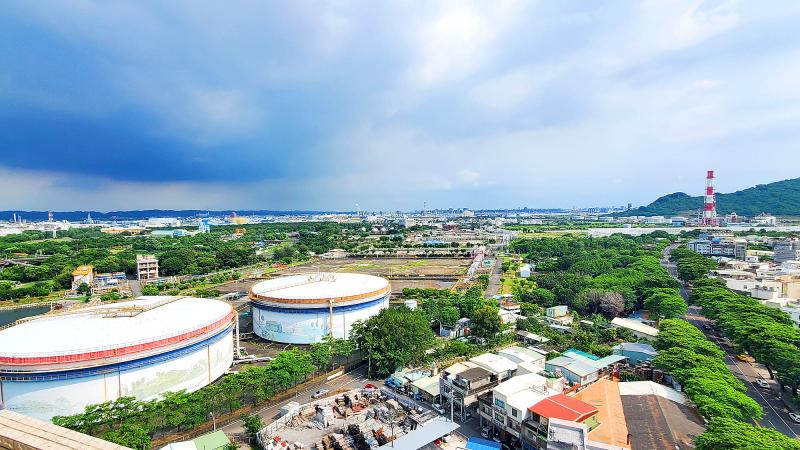Taiwan Semiconductor Manufacturing Co (TSMC, 台積電) yesterday said it was not ruling out any possibility after the Chinese-language Economic Daily News reported that the world’s largest contract chipmaker is planning to build a new 7-nanometer hub in Kaohsiung’s Linyuan District (林園).
TSMC is expected to build the process hub on a 169.5 hectare site that was until 2015 a CPC Corp, Taiwan (CPC, 台灣中油) naphtha cracker complex, the report said.
The chipmaker is to launch its Kaohsiung investment plan in 2023, the report said.

Photo: CNA
The company did not directly respond to the report, but said in a statement that Taiwan is its major production hub as it expands globally and it does not rule out the possibility of investing in Kaohsiung.
Setting up a new plant requires careful evaluation of factors, TSMC said, adding that it would continue to survey land in cities such as Hsinchu, Taichung and Kaohsiung to expand its production capacity.
It would make any expansion plans public when they are finalized, the statement said.
TSMC is rolling out chips made using the advanced 7-nanometer process at a plant at the Central Taiwan Science Park (中部科學園區) in Taichung.
Last month, Chinese-language media reported that Kaohsiung authorities had talks with TSMC to get an idea of what the chipmaker needed to invest in the city and raised the possibility of helping the firm to secure the land previously used by CPC.
The Economic Daily News report said that TSMC initially plans to build six 7-nanometer plants in Kaohsiung and use the city as its global hub to develop the process.
TSMC accounts for 85 percent of global 7-nanometer production capacity, analysts said, adding that if an investment in Kaohsiung is initiated, it would target boosting production to meet rising demand for Internet of Things and automotive electronics applications.
The 5-nanometer process is TSMC’s most advanced technology to enter mass production, with a foundry for the technology at the Southern Taiwan Science Park (南部科學園區) in Tainan operating since the second quarter of last year.
The chipmaker is building a 3 nanometer fab at the Southern Taiwan Science Park scheduled to start mass production in the second half of next year.
In addition, TSMC is investing US$12 billion to build a 5-nanometer fab in Arizona, with production scheduled to begin in 2024.
TSMC has said it is considering investments in Germany and Japan, and expanding in the US to meet strong demand in those markets.

South Korea’s equity benchmark yesterday crossed a new milestone just a month after surpassing the once-unthinkable 5,000 mark as surging global memory demand powers the country’s biggest chipmakers. The KOSPI advanced as much as 2.6 percent to a record 6,123, with Samsung Electronics Co and SK Hynix Inc each gaining more than 2 percent. With the benchmark now up 45 percent this year, South Korea’s stock market capitalization has also moved past France’s, following last month’s overtaking of Germany’s. Long overlooked by foreign funds, despite being undervalued, South Korean stocks have now emerged as clear winners in the global market. The so-called “artificial intelligence

‘SEISMIC SHIFT’: The researcher forecast there would be about 1.1 billion mobile shipments this year, down from 1.26 billion the prior year and erasing years of gains The global smartphone market is expected to contract 12.9 percent this year due to the unprecedented memorychip shortage, marking “a crisis like no other,” researcher International Data Corp (IDC) said. The new forecast, a dramatic revision down from earlier estimates, gives the latest accounting of the ongoing memory crunch that is affecting every corner of the electronics industry. The demand for advanced memory to power artificial intelligence (AI) tasks has drained global supply until well into next year and jeopardizes the business model of many smartphone makers. IDC forecast about 1.1 billion mobile shipments this year, down from 1.26 billion the prior

People stand in a Pokemon store in Tokyo on Thursday. One of the world highest-grossing franchises is celebrated its 30th anniversary yesterday.

NEW IDENTITY: Known for its software, India has expanded into hardware, with its semiconductor industry growing from US$38bn in 2023 to US$45bn to US$50bn India on Saturday inaugurated its first semiconductor assembly and test facility, a milestone in the government’s push to reduce dependence on foreign chipmakers and stake a claim in a sector dominated by China. Indian Prime Minister Narendra Modi opened US firm Micron Technology Inc’s semiconductor assembly, test and packaging unit in his home state of Gujarat, hailing the “dawn of a new era” for India’s technology ambitions. “When young Indians look back in the future, they will see this decade as the turning point in our tech future,” Modi told the event, which was broadcast on his YouTube channel. The plant would convert